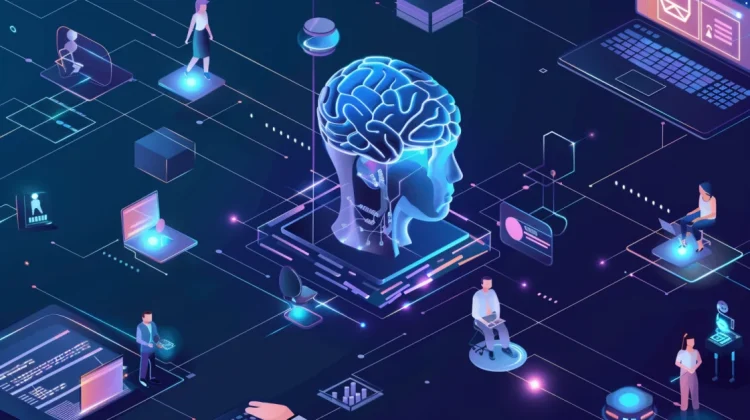Over the past few decades, the landscape of employment has undergone a significant transformation. Companies are increasingly utilising artificial intelligence (AI) to optimise their operations, increase productivity, and decrease expenses as a result of technological advancements. AI’s influence is apparent in nearly every sector, including finance, healthcare, retail, and manufacturing. AI has substantial potential in the development of online courses that are tailored to the requirements of the contemporary workplace. This article will investigate the potential of AI to revolutionise the process of course creation by enhancing its efficiency, cost-effectiveness, and efficiency in comparison to conventional methods. We will also explore real-world examples of AI-powered learning platforms and provide an analysis of the potential future implications of AI in corporate training.
The Acceleration of Course Development: The Influence of Automation
AI’s capacity to automate numerous tasks that were previously conducted manually by instructional designers and content creators is one of its most compelling advantages in course creation. These professionals dedicate hours to the development of assessment strategies, the selection of multimedia materials, and the creation of teachings. Nevertheless, this procedure can be significantly expedited with the assistance of AI algorithms. For example, AI course creation tools can generate assessments that are tailored to the subjects addressed in each lesson or recommend pertinent videos, images, and other resources that are consistent with specific learning objectives. Organisations can considerably reduce the time necessary to develop high-quality courses without sacrificing quality by utilising AI’s computational power.
Course Development at a Reduced Cost: Cost Savings through Customisation
Another significant advantage of AI in course development is its ability to enhance the learning experience by making it more cost-effective and personalised. The traditional method of classroom instruction entails the delivery of standardised curricula to large groups of students, which may not necessarily cater to the unique needs of individual learners. This is where AI becomes instrumental; it allows instructors to provide customised content to various individuals based on their preferences and talent levels. AI algorithms can suggest personalised learning paths that align with the strengths and weaknesses of each pupil by examining data such as test scores, learning styles, and previous performance. Additionally, AI has the capacity to provide learners with immediate feedback, directing them towards areas that require development and reinforcing concepts that have already been understood. Ultimately, AI-powered courses can deliver superior results at a reduced cost in comparison to traditional programmes, as they prevent wasteful duplication and repetition of content.
Improved Learning Outcomes: Improving Engagement and Retention
In comparison to conventional methods, AI in course creation provides numerous opportunities to enhance engagement, retention, and overall effectiveness. The following are three primary advantages of AI in improving educational outcomes:
a) Adaptive Learning: Just as previously mentioned, AI has the ability to analyse learner data and alter the pace, level, and type of content that is presented. It offers a learning environment that is adaptive, allowing learners to progress at their own pace rather than being restricted by predetermined scheduling or fixed timelines. Adaptive learning enables a more precise alignment between the cognitive capabilities of the learners and the curriculum’s requirements, thereby enhancing the rate of knowledge acquisition.
b) Intelligent Feedback: AI algorithms have the capacity to produce actionable, intelligent insights regarding learners’ performance and development. They are capable of recognising patterns of behaviour and emphasising areas that necessitate further attention or clarification. This feedback enables learners to identify their strengths and weaknesses, thereby enabling them to concentrate on enhancing the latter. Furthermore, AI can provide recommendations for additional reading material, simulations, or interactive exercises that facilitate the acquisition of specific skills.
c) Gamified Learning: Gamification is another thrilling application of AI in course development, which involves the employ of game mechanics, rewards, and competition to enhance learning retention, engagement, and motivation. The development of immersive educational games that dynamically adjust the difficulty levels, challenges, and feedback to match the proficiency levels of learners is now feasible due to AI technology. Gamification can generate personalised and highly engaging learning experiences that maintain users’ motivation, productivity, and engagement by incorporating AI.
Real-World Examples of Corporate Training Platforms Powered by AI
Various aspects of their learning and development initiatives have already been integrated with AI by numerous companies. We will examine two prominent examples:
Coursera is a prominent provider of MOOCs, offering thousands of online courses in a variety of disciplines. Landit, an AI startup that utilised AI algorithms to match job seekers with appropriate employment opportunities based on their qualifications, experience, and aspirations, was recently acquired by the company. Coursera’s objective is to capitalise on Landit’s AI expertise to develop more sophisticated recommendation engines that are customised to the user’s profile, thereby recommending courses, specialisations, and degrees.
IBM Watson Education is a platform that is specifically designed for K-12 education and is founded on artificial intelligence. Watson Elementary, the company’s premier product, employs natural language processing techniques to address inquiries from elementary school students about a variety of subjects, including math, science, social studies, and English Language Arts. Learners are able to more easily understand complex concepts by receiving instantaneous responses and explanations through Watson’s conversational interface.
Future Consequences of Artificial Intelligence in Corporate Training
AI is expected to revolutionise a variety of aspects of the learning landscape, such as content creation, delivery, evaluation, and analytics, as it continues to develop. Examples of potential developments include:
a) Virtual Coaching Assistants: The widespread adoption of AI chatbots in learning environments, which will enable them to provide virtual coaching services, address inquiries, and address concerns around the clock, is imminent due to advancements in speech recognition and NLP technologies.
b) Learning Experiences Enabled by Augmented Reality (AR): AR technology seamlessly integrates digital information with the physical world to create immersive learning scenarios that seamlessly integrate theory and practice. AR applications could enable learners to securely experiment with new ideas before applying them in practical settings by utilising AI to create more realistic and responsive simulations.
c) Continuous Learning: AI algorithms have the potential to facilitate continuous learning, which would involve learners receiving continuous feedback, recommendations, and guidance even after they have completed formal courses. This would enable individuals to continuously enhance their existing competencies, acquire new ones, and remain informed about industry trends throughout their careers.
In conclusion,
In summary, AI has the potential to significantly improve the efficiency, efficacy, and accessibility of course creation in the corporate sector. It enables organisations to rapidly, affordably, and effectively create and implement personalised, high-quality learning solutions. Although there are still some constraints and obstacles associated with the integration of AI into corporate training, it is evident that AI will continue to substantially disrupt and reshape the learning ecosystem in the next few years. Consequently, it is essential for businesses and institutions to invest in the development of AI capabilities in order to maintain a competitive edge and promote workforce agility.











